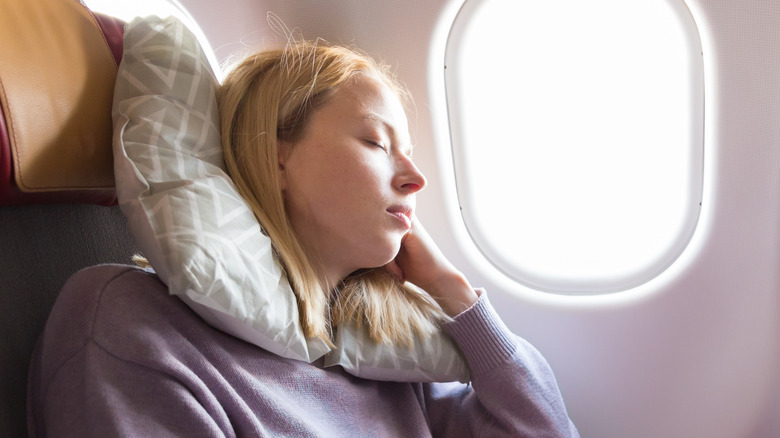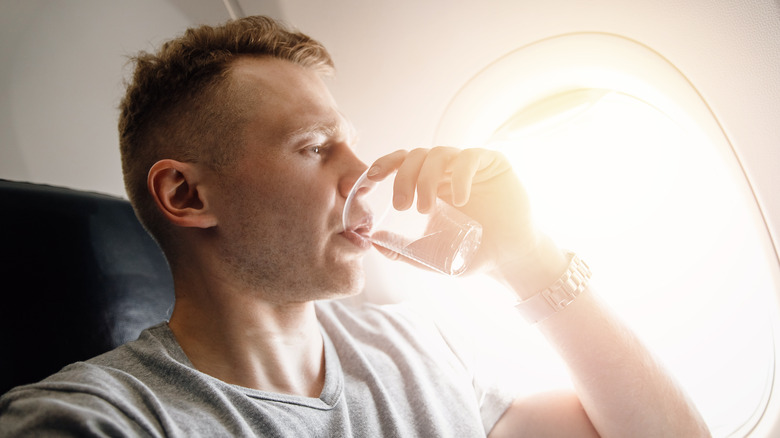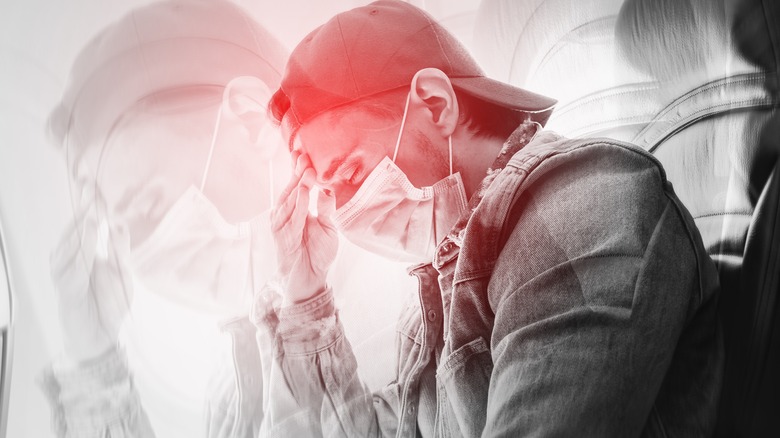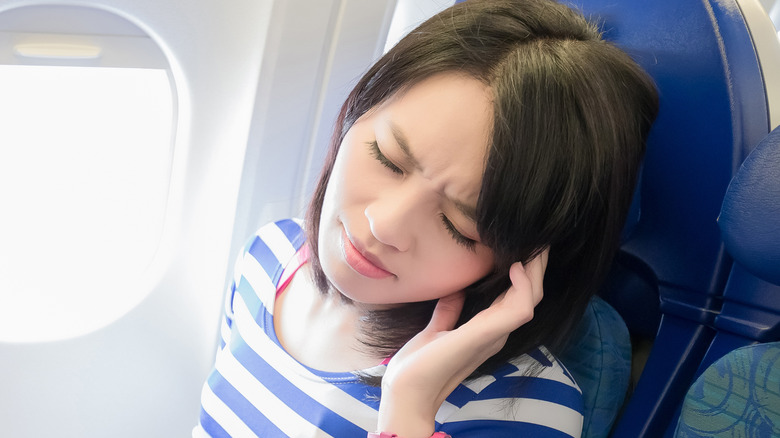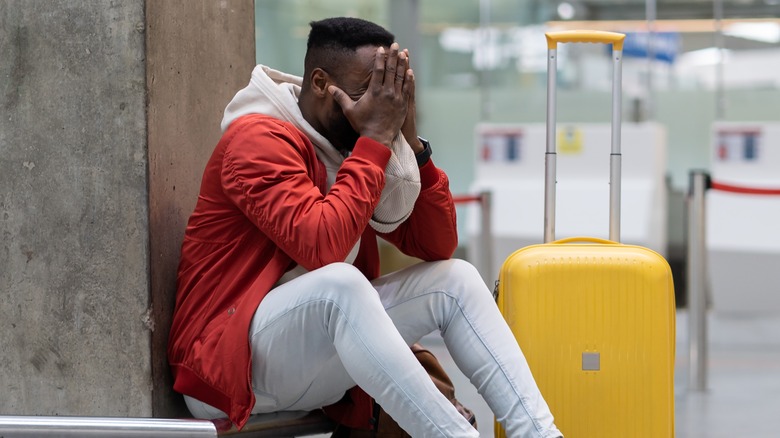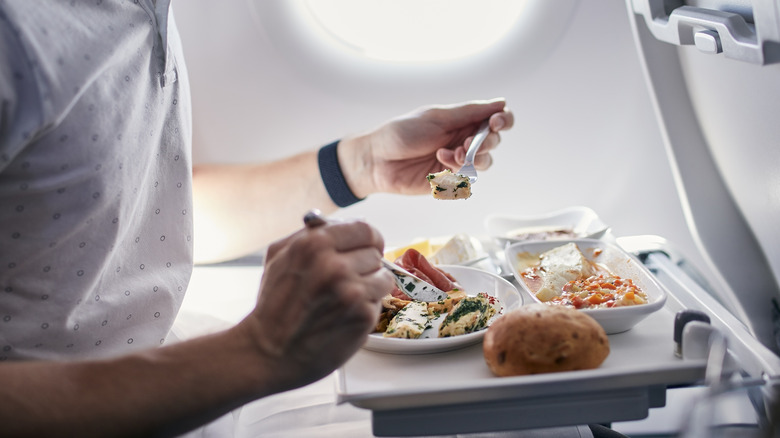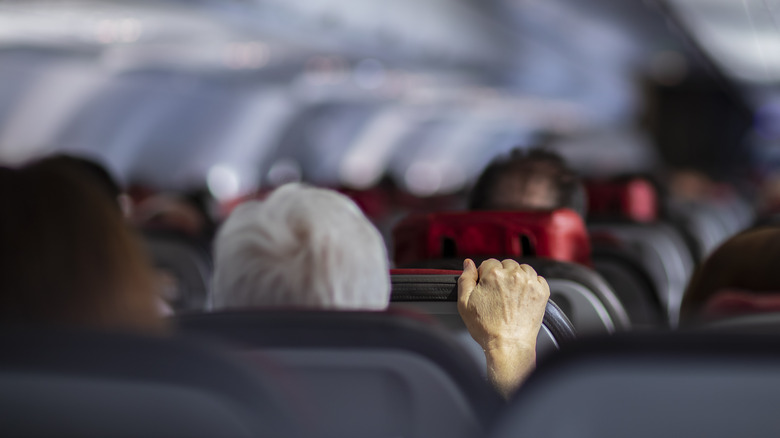What Happens To Your Body When You're Flying For Over Six Hours
Flying can be seriously stressful, from getting to the airport all the way through baggage claim. There are many ways to combat this anxiety, whether you leave with plenty of time or you go through a checklist of things you should do before getting on a plane. In 2019, a study by Priority Pass examined the aspects U.K. travelers find most stressful before they even take off, with about 60% agreeing that they worry most about getting stuck on their way to the airport. But once you get there in one piece, you're checked in, have cleared the security checkpoint, and you've found your gate, you can relax, right?
As it turns out, it's not just the stress levels and exhaustion that can have a major impact on you when traveling by plane. Between takeoff and landing, a lot of things happen to your body, too, and depending on your medical condition, you might be more affected by flying than others. Seeing as how your body is accustomed to being, well, on the ground, the changes in air pressure, oxygen levels, and atmosphere can have some surprising effects on your skin, circulation, and even digestion.
If you're planning on taking a long flight soon, don't get too spooked. Here's what happens to your body when you're flying for over six hours, and how you can alleviate any of the associated discomfort.
The air dehydrates you
When you board an airplane, you enter into a climate-controlled environment, which is essential to survive at such high altitudes. Annoyingly, this means that the humidity in a plane is incredibly low, which dries out the air. Yasmin Badiani, a physiotherapist for Phizz (a rehydration supplement brand), spoke to Marie Claire U.K. about the dehydrating effects of air travel. "The relative humidity can be as low as 10-15%, which is three times drier than the Sahara desert," Badiani said. The lower oxygen levels can make your breathing rate increase, and with such dry air, you're quick to dehydrate.
Because of this, a six-hour flight can result in a 2% loss of your body's water, even if you drink an average-sized bottle of water during the trip. According to Badiani, this dehydration level "has significant impact on the health and mood of passengers and can affect cognition, attention, memory, and critical thinking, as well as leading to feelings of tiredness, fatigue, and irritability."
So what can you do to combat this? According to the Aerospace Medical Association's health tips for airline travel, aim to drink around 8 ounces of water for every hour on board. You can also retain some of your body's fluids by avoiding dehydrating beverages, like coffee, tea, alcohol, and caffeinated sodas. You might still come off your flight feeling a little dehydrated, but grabbing a big bottle of water at the duty-free should fix you right up.
Pressure changes can mess with your sinuses
If you've ever traveled by plane, you've probably noticed those little popping sounds in your ears, which is caused by the dramatic shifts in barometric pressure as the altitude either increases or decreases. Your nose, forehead, temples, and even your cheeks are filled with little pockets of air, which are better known as your sinuses. When the pressure around you changes, your body naturally equalizes your internal pressure, but it can take a few moments. That's why you might feel discomfort or pain in your nose, ears, eyes, head, and teeth, while the plane is ascending or descending.
If you're dealing with a sinus infection, cold, or allergies while traveling, your eustachian tubes might be blocked and your body can have a tougher time equalizing the pressure. This amount of pressure on your sinuses can be incredibly painful and even dangerous, so knowing how to give your sinuses a hand in this situation can save you from a painful trip.
There are decongesting medications you can take ahead of time if you know you're especially sensitive to these pressure changes. You can also chew gum, sip some water, or try the Valsalva maneuver, where you pinch your nose closed, shut your mouth, and exhale very gently to pop your ears. It should be noted though that this isn't the safest method for those with high blood pressure or if you have any cardiovascular issues.
Pressure changes can also cause an airplane headache
During takeoff and landing, some people develop a unique type of headache, unlike a migraine or headache. It's believed that this is caused by the changing barometric pressure on the plane, but still very little is known about this phenomenon and more research is needed for experts to fully understand the cause. What they do know is that an airplane headache most often occurs behind the eye or in your temple as an excruciating pain, but that they rarely last for more than half an hour.
A review by The Journal of Headache and Pain was conducted in 2017 to better understand airplane headaches, which found that a small percentage of people complained of a "second-phase" headache, which lasted anywhere from a couple of hours to a day, but researchers weren't sure whether this pain was linked to their first headache.
Because so little is known about airplane headaches, it's hard to prepare for one in advance. If you suffer from migraines, you probably know how to pack your carry-on bag in the event you have an attack mid-flight. Painkillers or anti-inflammatory drugs might help, or bring a neck pillow, eye mask, and noise-canceling headphones if you have to ride out a splitter. Don't forget that the airplane will be stocked with anything else you might need, like an ice pack or water, and the flight attendants will more often than not be happy to assist.
Your digestion gets thrown out of whack
Drinking mimosas in first class is a pretty glamorous way to travel, but one aspect of flying that's a little less sexy is how your digestion can be affected — and it's not just due to the airplane food. Gas and bloating during and after a flight are surprisingly common, all thanks to those barometric pressure changes on the plane. Dr. Megan Rossi told Women's Health, "Your gastrointestinal tract is like a long tube, and any gas trapped in there will expand and put more pressure on it." The effects of this unfortunate gut reaction can include bloating or gas, which can be even more severe for those who have irritable bowel syndrome.
You can feel somewhat helpless if you're stuck on a long flight and your stomach starts to act up, so to avoid these tummy woes, start preparing in advance. The day before your flight, aim to eat plenty of vegetables (ideally ones that don't cause gas) and try to go to the bathroom before you fly. Drinking a glass of warm water with some lemon can ease your digestion the morning of your flight, and from there, you should avoid carbonated, caffeinated, and alcoholic drinks. Foods that contain lots of oil, carbs, dairy, and salt should be kept to a minimum. Staying active while at the airport and getting up every couple of hours on your flight can help as well.
Immobility can cause your blood to clot
One of the main reasons doctors recommend office workers and those with sedentary lifestyles to get up once an hour is to benefit your circulation. Sitting for long periods of time can cause your blood to clot, also known as deep vein thrombosis. So when you're stuck on a plane (or really any mode of transportation that requires you to sit in a confined space) for hours on end, this might become a concern.
According to the Centers for Disease Control and Prevention, some people have a higher risk of developing blood clots, like those over 40, users of estrogen-based birth control, people with high BMI, and those with a family history. Luckily, most blood clots dissolve on their own, but there is the risk of them breaking off and traveling to your lungs, causing a pulmonary embolism.
So, how do you avoid getting blood clots when you have very little room to move on a cramped airplane? Danielle Bajakian, director of the Vein Program and a vascular surgeon, told Columbia University Irving Medical Center that walking around the cabin is helpful, but not always possible. Instead, she said, "If you don't have to travel with a lot, don't. Put everything in your overhead bin. Otherwise you don't have room to move. Doing exercises and staying hydrated are really the best tools we have on long flights." Wearing loose-fitting, comfy travel clothes that allow for circulation can help as well.
Jet lag is more than just feeling tired
If you've traveled in and out of different time zones, you've likely felt the effects of jet lag. Drowsiness, difficulty falling or staying asleep, and moodiness are common among jet-lagged travelers, but interestingly, there's more to it than just your sleep schedule getting thrown off by your trip. When you're on a plane for an extended period, your circadian rhythm (or internal clock) can become confused. Sunlight plays an important role in your circadian rhythm, as daylight triggers hormones to make you feel more alert while melatonin is released at nighttime, which helps you sleep. Your body gets a lot of mixed signals when you're traveling, especially when you're sleeping at irregular times, and jet lag can take a couple of days to overcome.
Why is this a big deal? Scott Cohen, a professor at the University of Surrey, says jet lag can actually have more ill effects on your body than tiredness. "Frequent jet lag disrupts genes that influence aging and heightens the risk of having a heart attack," he told Vox. Obviously, this can lead to significant health problems. "The interference with the body's rhythms reflects a widespread disruption of many biological processes."
Typically, the further you travel, the worse the effects of jet lag can be. You can combat this by resting before your trip, trying to get on schedule with the time zone you're traveling to beforehand, sleeping on the plane, and drinking lots of water.
Your sense of taste and smell go out the window
Airplane food is rarely something to get excited about. It's often just as flavorful as a slice of unbuttered white bread. But you shouldn't blame the airlines, as they usually go the extra mile to over-salt and season the food they serve. What you should blame is the cabin pressure, humidity, and even the background noise of the engine for numbing your taste buds.
The director of in-flight dining and retail at American Airlines, Russ Brown, told the BBC that our sense of taste and smell diminishes on a flight: "Flavor is a combination of both, and our perception of saltiness and sweetness drop when inside a pressurized cabin." According to a study by Fraunhofer Institute for Building Physics IBP, our taste of sweetness and saltiness are most affected, with air travel depleting them by around 30%. The dry air mixed with your body adapting to barometric pressure changes add up to a weakened sense of taste, but how is the noise to blame?
One study from Food Quality and Preference found that the sound participants listened to while they ate their meals made a dramatic difference in how they rated the flavor of the food. Most reported that salty and sweet flavors were less intense when listening to a loud noise. Apparently, the flavor of umami isn't as affected, so if you want to enjoy more flavor on your flight, opt for tomato juice, soy sauce, and mushrooms.
You get less oxygen
Look, the fact that there's enough oxygen for a hundred people to survive on an airplane traveling hundreds of miles per hour at tens of thousands of feet in the air is pretty impressive. However, the oxygen levels on a plane are still lower than what our bodies are used to, as at just 3,000 feet in elevation, the oxygen molecules you breathe have already been reduced by 10%. This number drops even more once an airplane reaches 35,000 feet, as Brent Blue, a pilot and doctor, told Vox: "The cabin is only pressurized to simulate an elevation of 6,000 to 8,000 feet on modern jets."
There's a reason mountain climbers often bring oxygen with them up to the summit. The higher you go, the less oxygen there is to breathe, and for those with higher risk factors, this can be deadly. You might feel lightheaded, sleepy, confused, or euphoric, or you might struggle to breathe, which could be signs of hypoxia, which is when your body is seriously oxygen-deficient. This would be rare in the case of commercial flying, so you likely have very little to worry about, but you can still be affected by the lack of oxygen.
To maintain your oxygen levels while flying, avoid alcoholic drinks, get up occasionally if possible during your flight, and wear compression socks to reduce blood pooling in your legs, which can exacerbate symptoms.
You're exposed to radiation
Many travelers suffer from flight anxiety, and we're genuinely not trying to give you another reason to fret, but radiation exposure is a very real aspect of being an airplane passenger. Luckily, the occasional flight doesn't pose much of a risk. For example, flying from California to New York would expose you to less radiation than a single chest X-ray (per CDC). But as Scott Cohen told Vox, "Some frequent flyers would be surprised to learn that their exposure to radiation exceeds that of nuclear power workers."
This is because radiation is always being emitted toward the Earth by the sun and stars, but the planet's atmosphere serves as a barrier. Flying in an airplane over this protective barrier can bring about a stronger level of radiation. If you've already flown a couple of times this year, don't worry. It's those who fly a couple of times a month who may be exposed to potentially dangerous levels of radiation.
This is because Radiation Emergency Medical Management has a recommended limit as to how much the human body can be subjected to radiation, and it would take around 137 hours of flying annually (or 25 flights from the west coast to the east coast) before this limit was reached. There's little that can be done about this unfortunate aspect of air travel, but there's also very little to worry about if you keep your flights to a minimum.
The air dries up your skin
Have you gotten off a flight to find your lips chapped, hands dry, or your skin broken out? That's the pesky low humidity in the cabin at work, and unfortunately, your skin isn't immune to its drying effects. Renée Rouleau, an aesthetician, told Well+Good, "Dry air will always seek moisture wherever it can get it, and that means it's going to take it directly from deep within your skin." This means that if you have dry skin, the air will make it worse. If you think you can get by with oily skin, think again, as Rouleau said "[The low humidity] can even make oily skin oilier because when the skin has no water, it attempts to compensate for the dehydration by producing more oil."
Joshua Zeichner also spoke with Well+Good about the other more serious skin issues flying can cause. "Your skin is at risk for UV light damage on the plane, as you are much closer to the sun at 10,000 feet and UVA light can penetrate right through window glass."
You can fight back and retain some of your skin's precious moisture by using a hydrating facial mist, loading up on moisturizer, drinking plenty of water, and wearing sunscreen, even if you won't be spending much time outside that day. When you get off your flight and return home or check into your hotel, make sure you keep the hydration up to replenish your skin.
Pressure changes can give you bad breath
As strange as it might sound, flying for long periods can actually give you some pretty foul breath. While you're up in the air and the barometric pressure changes are wreaking havoc on all of your normal bodily functions, some of your internal systems can slow down. One of these functions is your body's ability to produce saliva, which is of course worsened by the dry air. When your mouth gets dry, bacteria multiply and make for smellier breath. This problem can also be caused by hunger, thirst, infrequent meal times, or forgetting to brush your teeth when traveling.
J. Nick Russo, who was once president of the Academy of General Dentistry, told the Center for Breath Treatment that another reason for this breath issue is that, "Many people increase their fast food and soda intake while traveling. This leaves food particles in the mouth that produce a sulfur compound and cause bad breath."
It can be embarrassing to realize you have dragon breath, especially when traveling with others. Luckily, there are a few hacks you can use when flying that will keep your breath as fresh as can be. Consider packing travel-sized toiletries like toothpaste, floss, and mouthwash, and stop off at the airport bathroom to freshen up. Keeping mints and gum handy is a great tip as well, but probably the most useful item at a moment like this will be a bottle of water.
